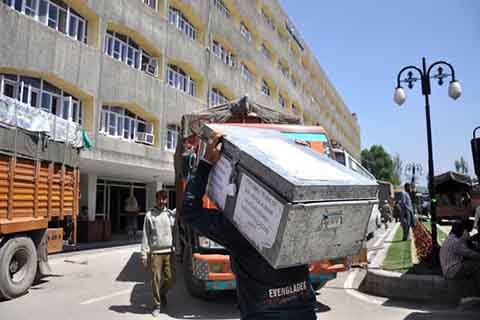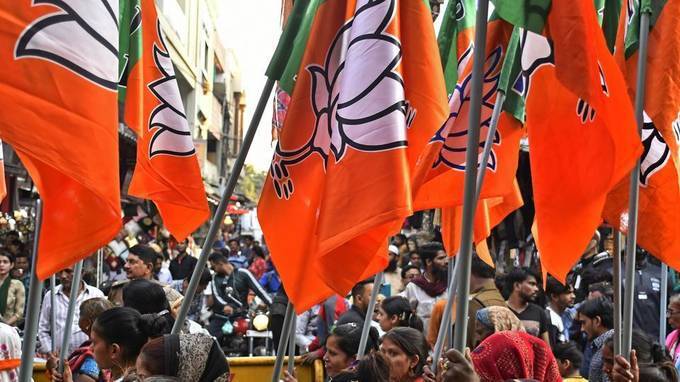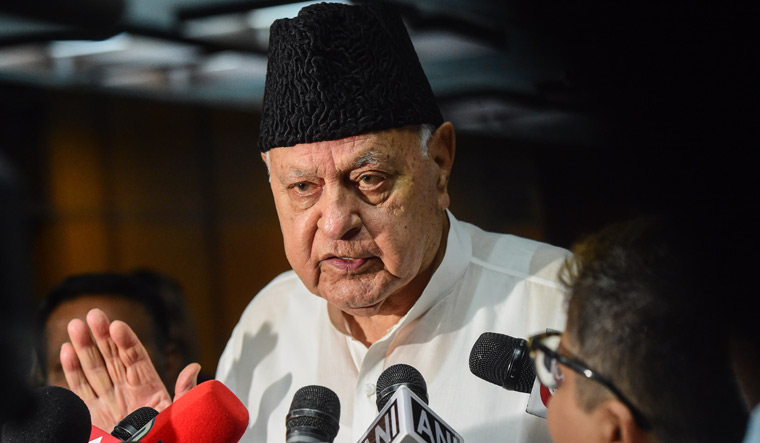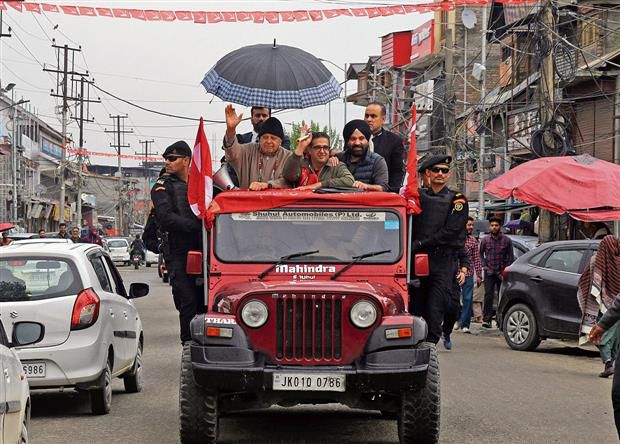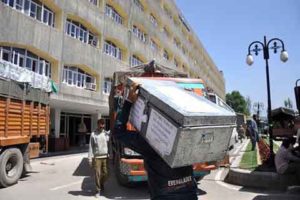 The Civil Secretariat in J&K’s summer capital Srinagar is set to close and shift to Jammu for next six months. This time however, the highest seat of governance functioned in the Valley only for a “brief time” and continued to remain ‘paralyzed’ in the wake of massive protests and clashes triggered by the killing of Hizbul Mujahideen commander Burhan Wani on July 8.
The Civil Secretariat in J&K’s summer capital Srinagar is set to close and shift to Jammu for next six months. This time however, the highest seat of governance functioned in the Valley only for a “brief time” and continued to remain ‘paralyzed’ in the wake of massive protests and clashes triggered by the killing of Hizbul Mujahideen commander Burhan Wani on July 8.
On Thursday, there were no long queues of people outside the highly-fortified Secretariat here, nor were its corridors bustling with any activity. This may be a usual scene on the last day of Durbar in Srinagar, but it was an everyday scene in the past more than six months.
When the J&K Government started functioning here from May 9 after the PDP-BJP government led by Mehbooba Mufti took the oath of office, the seat of governance witnessed a good rush of people who turned up at the place every day in the hope of getting their grievances redressed from ministers and bureaucrats.
But this ‘affair’ proved to be short-lived as the government’s priorities soon shifted to Budget Session which commenced from May 25. With Government getting engaged in the budget business—from preparing replies to facing opposition—people who turned up during this period had to return disappointed as ministers and babus were hardly available to meet them.
As the Budget Session ended, Kashmir was in the grip of an anti-India uprising triggered by the killing of Burhan Wani by forces in south Kashmir’s Anantnag district. The uprising is on. With no let-up in protests across the Valley, governance came to a grinding halt in the region, with functioning of the Civil Secretariat hit hard.
At the peak of the uprising, the Civil Secretariat, which houses J&K’s Chief Minister, Council of Ministers and top bureaucrats, witnessed minimal attendance. Even on some days, the attendance was as low as 200.
“It seemed that secretariat never functioned here. This period of Durbar Move should be expunged from records,” a junior-level KAS officer said in a lighter vein. “I myself couldn’t come to office for more than two weeks due to curfew and protests. Most of the lower-rung staff couldn’t manage to come to the secretariat for more than one month.”
Another official said most of the ministers from Jammu preferred to stay in their constituencies “during the toughest time in Kashmir.”
“They hardly stayed here,” he said.
However, J&K Government spokesman and Education Minister Naeem Akther said the Secretariat “functioned as best as it could under the given circumstances.”
“During the first few weeks, the presence of employees was very less and general public also did not turn up. But after that, things improved,” he claimed.
He said during the past two months, the “business is going on as usual.”
“That is why we could maintain all the essential services including power, water and ration. Secretariat does not control only Kashmir where the trouble erupted. We have other areas which are to be governed and they received due governance,” he said.
On Thursday, the last day of Durbar here, corridors of the secretariat were stuffed with bags and trunks packed with official records and files.
The civil secretariat closes here as part of the 144-year-old practice of bi-annual shifting of government offices between Srinagar and Jammu. The practice was started in 1872 by then Dogra rulers to “give a fillip to the economy of Jammu.”
As per the General Administration Department, 50 offices including civil secretariat— which houses the offices of Chief Minister, cabinet ministers and administrative departments—move in full while 52 offices move in camp. The offices will reopen in Jammu on November 9.
From time to time, politicians and business community have questioned the practice which is draining the state exchequer and hitting governance as well.
In April 2012, then Chief Minister Omar Abdullah questioned the wisdom of Durbar Move, saying: “It is wastage of money and an escapist move. Do I think the ‘Durbar move’ (shifting of capital) is a waste of money? Yes I do. Is there an alternative? I haven’t seen a viable alternative suggested.”
Omar’s father and former chief minister, Dr. Farooq Abdullah, had to face stiff resistance from Jammu-based lawyers in 1980 when he tried to abandon the practice in ’80s. Finally he gave up the plan.
Rough estimates suggest that the exercise puts a burden of Rs 90 crore on the state exchequer after every six months.

